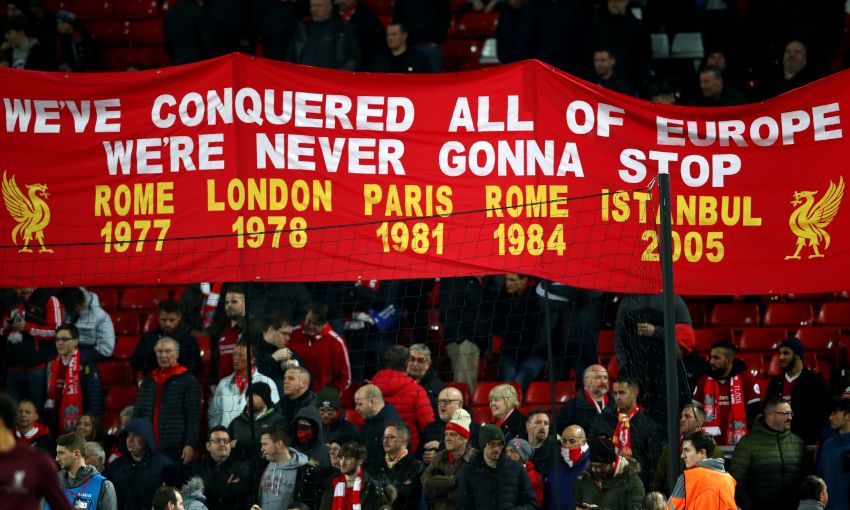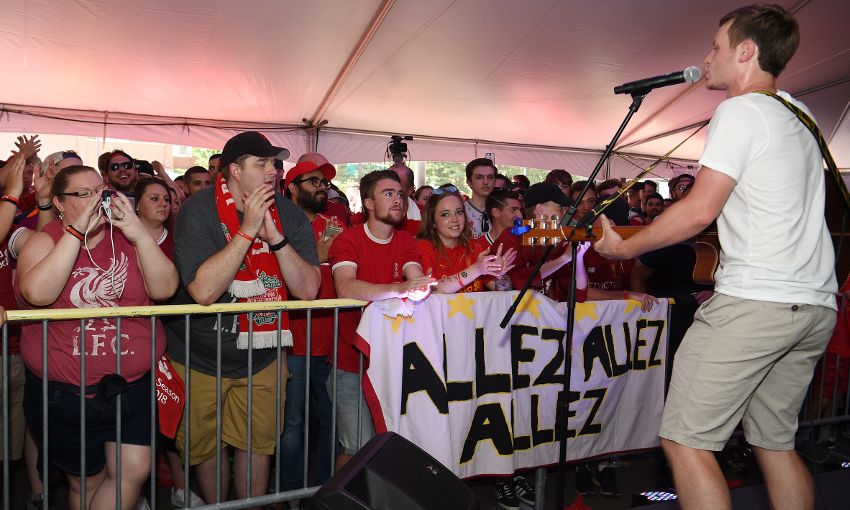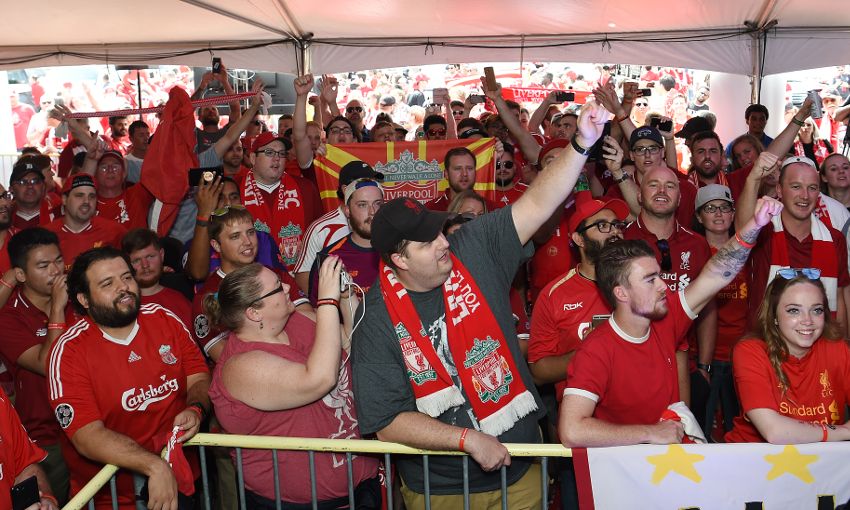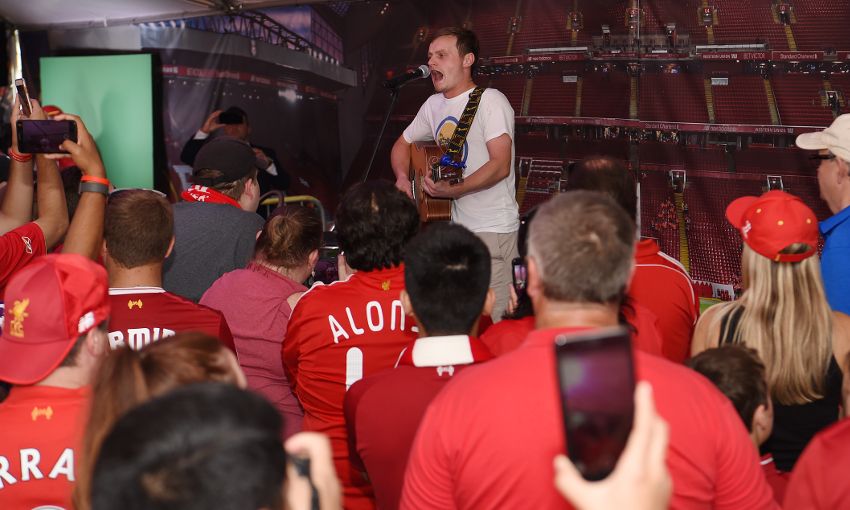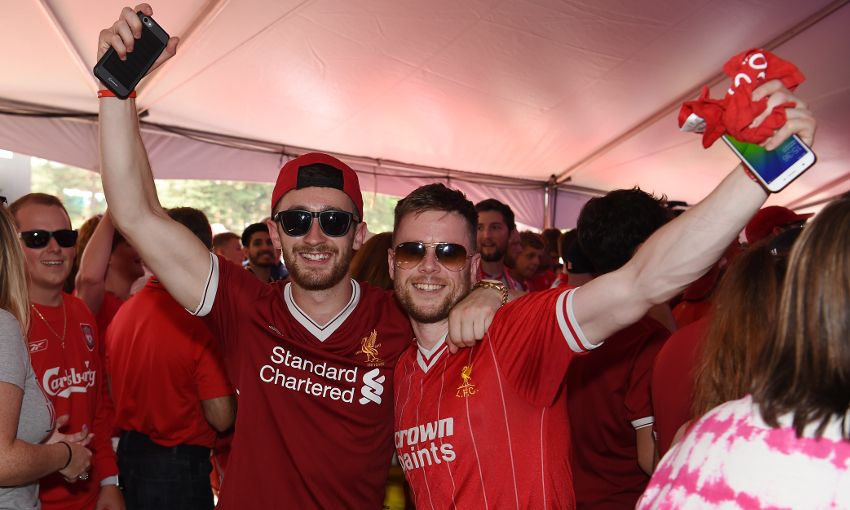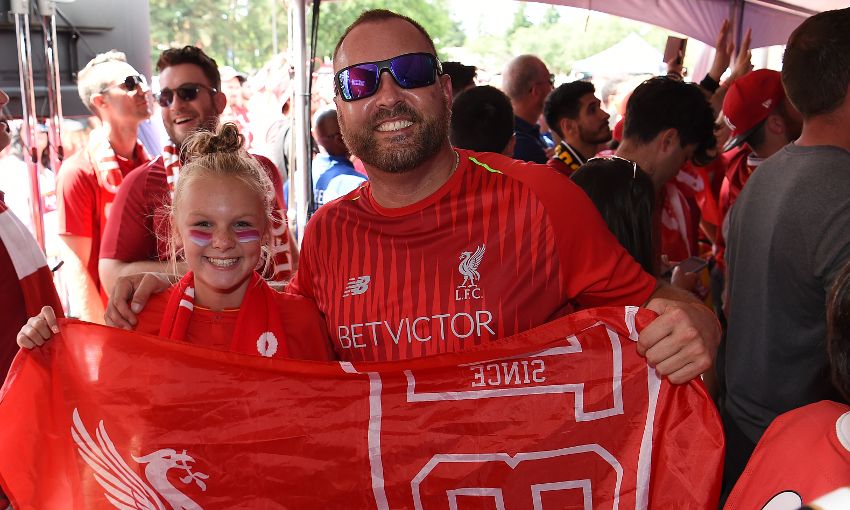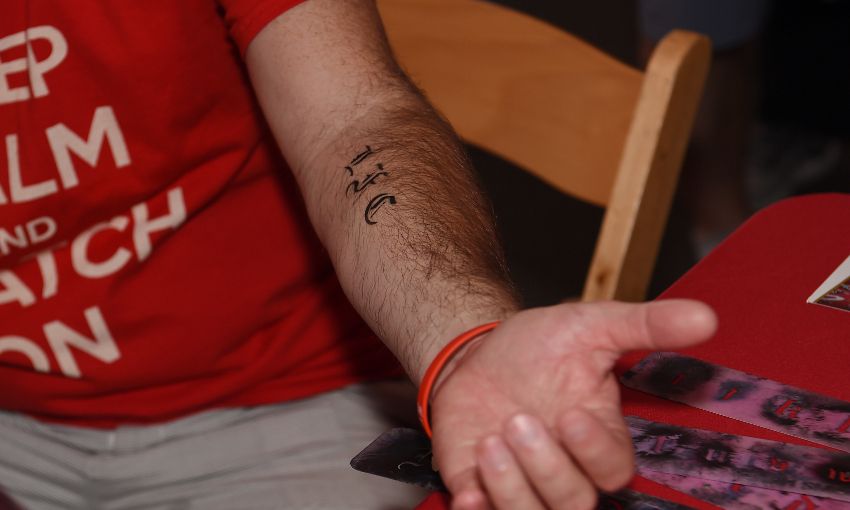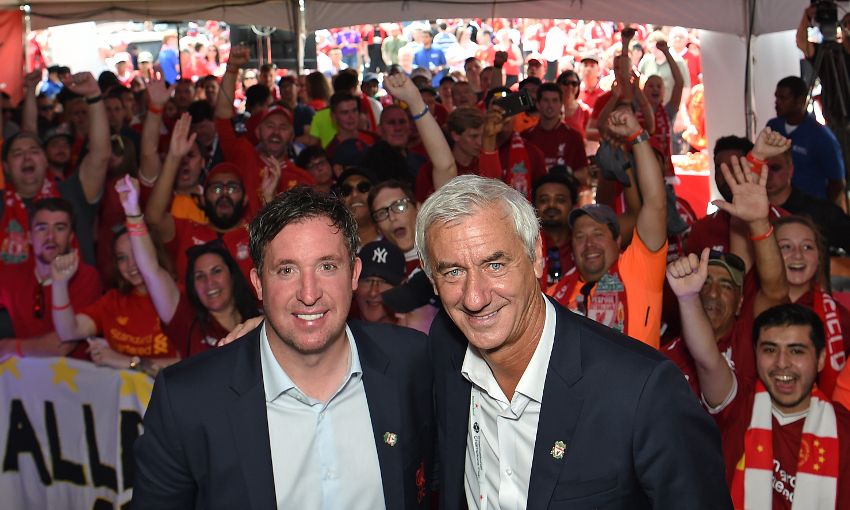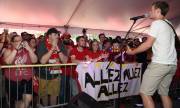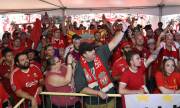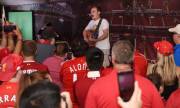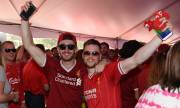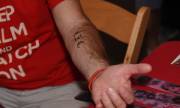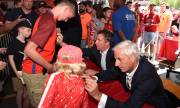'Mozart didn't write Poor Scouser Tommy!'
"It was really hard to take, to lose the final," Jürgen Klopp confessed in an LFCTV documentary broadcast last summer.
“But the whole road to Kiev was exceptional. I enjoyed every second. For me, it felt like we again came closer together. Our faith and belief is enough to do it again and again and again.”
Klopp’s comments touched on two concepts prevalent at the time.
One was a palpable sense that the team and fans had come together as one during Liverpool’s journey to the 2017-18 Champions League final. The other was a sense that Kiev was a beginning, not an end, for the squad of players at Klopp’s disposal – and given their performances so far this season, that appears to have been borne out.
But what about the fans? Could the fervour seen among the thousands that gathered in Shevchenko Park, on a day that many of them unreservedly describe as the best of their life – despite the result that followed – be bottled and maintained through the new campaign?
Watch: Shevchenko Park - A Boss Session
“In the summer it was like: ‘Are we going to be able to pick ourselves up and go again next season?’” BOSS Night musician Kieran Molyneux recalls.
“But when the season started and the team was winning games and around the top of the table, it reminded everyone how good we actually are and reminded us of the power fans have got. There’s definitely something in the air…”
BOSS Nights, Jamie Webster, the Egyptian King, James, The Beautiful South, Allez, Allez, Allez – the tale of last season’s explosion of fan culture on the red side of the city is well known by now.
As new anthems were created and popularised, tickets for the BOSS Night events held at District in the Baltic Triangle repeatedly sold out within seconds and musicians such as Kieran and Jamie found themselves very much in demand.
This season the fan culture phenomenon lives on, but with a slight shift of emphasis onto league games – owing to the Reds’ battle for the Premier League title – and an updated songbook.
The Mohamed Salah song and Allez, Allez, Allez remain staples but are now complemented by new additions eulogising Virgil van Dijk and Roberto Firmino, performed at BOSS Nights held not just in the city but in Dubai, Paris and Dublin, with other foreign dates likely between now and May. There’s even a special kids-only version planned for later in the season.
“Without a doubt it has gone well beyond what we expected,” says Shaun O’Donnell, one of the BOSS Night organisers alongside friend Daniel Nicolson. “In Paris, we’d said to the venue we hoped it would be full within a couple of hours of opening, and I believe within the first 40 minutes it was locked out and there were people outside, so it was another crazy one.”
Jamie Webster and BOSS Night at LFC fan event in Michigan last summer
The manner in which Shaun and Daniel’s project has mushroomed is all the more remarkable considering its relatively humble origins, not to mention the fact that it is something the duo do for a bit of fun on top of the full-time jobs they both work.
“We’ve been doing these events for over five years,” Shaun explains. “They were called ‘Sunday Sessions’, it was when Liverpool were in the Europa League for the first time in a long time, so they were playing a lot on Sundays and we wanted to make Sundays more of an event – get people to the same place with some live music.
“The first one, there were probably only 80 people in a very small room in Osqas, it was just our mates and friends of friends. Since then it has had a really organic growth. We moved on to Sound on Duke Street, which holds about 250, and then on to District. That’s where the social media following started, and we started to attract the mainstream and not just hardcore fans.
“There’s been a collective realisation among Liverpool fans that when we pull together we can create something pretty special, and instead of Kiev being the end of the story, it was the start. If you go back four or five years to where we maybe weren’t doing so well, it wasn’t the cool thing to do to be coming out with new songs, but it is now. I saw a video of schoolkids in Africa singing the Mo Salah song – it’s just absolutely crazy how something like that can go from a warehouse in Liverpool to the streets of Africa.”
***
He’s our centre-half,
He’s our No.4,
Watch him defend, and we watch him score,
He can pass the ball, calm as you like,
He’s Virgil van Dijk,
He’s Virgil van Dijk
***
Molyneux still has a day job, but it’s fair to say his life has changed since this time last year. The 26-year-old from Walton now performs in The Sandon pub before and after every Liverpool game and was part of the BOSS Nights in Kiev, Paris and Dublin.
“The thing is, these people don’t get the chance to go every week,” he states. “Some of them live abroad, some might not be able to afford it, for some it might not be possible logistically, so they’re seeing people like me and Jamie who are the men on the ground so to speak, and they want to have a little part of that, and you can feel it when you play those gigs.
“Sometimes you might not know the faces of the people coming up and saying, ‘Can you play this, can you play that?’, but you know everyone is on the same page.”
The Cambraco bus on which Kieran and Jamie travel to away games has become something of a hit factory in itself, giving us an LFC version of Rotterdam by The Beautiful South last season (“We’ve been to Hoffenheim and Maribor…”) and more recently, the Van Dijk song to the tune of Dirty Old Town by The Pogues.
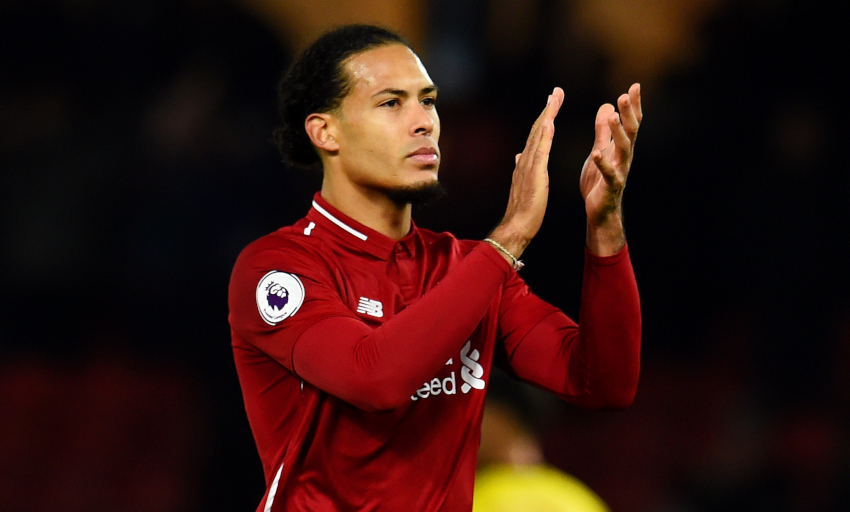
“It was Jamie and a lad called Kearnsy, I came up the back of the bus and they had this structure of the song,” Kieran explains. “At first I think it was, ‘He’s our centre-half, he’s six foot four’, and that was changed to ‘He’s our No.4’ and stuff like that.
“So, it started on the bus and then the power again of Jamie playing the Halfway House, me playing the Sandon, the BOSS Nights – it goes viral in seconds now. Years ago, to get a song off the deck you had to sing them in pubs for months on end, you’d be stood in the ground getting your mates to join in until it caught on, whereas now it can be filmed on a bus and by the time you leave the away end it’s already viral and people are singing it on the way home.
“Before the BOSS Nights me and Jamie will sit upstairs for about 10 minutes just trying to figure out what they’re singing downstairs, and then go on stage and sing it. We never claim to have made all these songs up and we never claim to be responsible for the success of the songs, we just play them because we know people want to hear them.”
***
There’s something that the Kop wants you to know,
The best in the world, his name’s Bobby Firmino,
Our No.9, when he gets the ball he’ll score every time,
Sim senhor, give the ball to Bobby then he will score
***
If you’ve been to a Liverpool match in the last couple of months, or even if you haven’t, the chances are you’ll recognise these words.
In much the same way as Salah’s song pinballed from Twitter to the pub to the stands until you heard it everywhere you went last season, the ode to his fellow forward Firmino has been this season’s massive word-of-mouth hit, and it’s all down to a 23-year-old and his mates.
Truly global in nature, the song was inspired by Argentines, ordered by a German, is dedicated to a Brazilian and was first written and sung in the Serbian capital.
“Bobby deserved a song, most of the other lads had one, and Jürgen asked for a Bobby one last season, so we just thought it was a bit of a laugh,” says the creator in question, season ticket holder Ben Stevenson, who had been watching the video of a River Plate song on loop when he arrived in Serbia to see Liverpool play Red Star Belgrade in the Champions League last November.
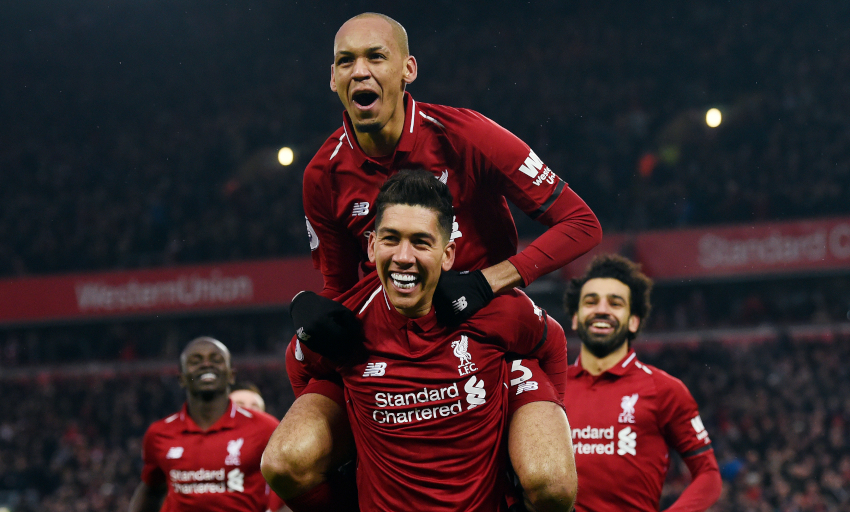
The song was De la Mano del Muñeco, sung to the tune of a ballad by Argentine crooner Fito Páez, and essentially it was River’s Allez, Allez, Allez – a song that captured the sheer joy of following your team across a continent en route to a final, the 2018 Copa Libertadores final in their case.
“The River Plate video was doing the rounds on social media, and a few of the lads kept singing it while we were there, and I just came up with the words ‘Give the ball to Bobby then he will score.’ A couple of the lads thought it was quite good and we just sat down in a bar and came up with the rest of it.
“We tried to change a few of the words from Spanish to Portuguese – ‘sí señor’ to ‘sim senhor’ – because Bobby speaks Portuguese and we thought that’d be a bit more appropriate.
“We started singing it on the bus from the city centre to the ground, a load of young lads at the back of the bus cottoned on to it, and it all got going from there. The videos started going round and we were like, ‘No way, that’s caught on.’ It’s surreal, but it’s a good song, and any song that gives the players an extra 10 per cent is a good thing.”
***
We've conquered all of Europe,
We're never going to stop,
From Paris down to Turkey,
We've won the lot,
Bob Paisley and Bill Shankly,
The fields of Anfield Road,
We are loyal supporters,
And we come from Liverpool,
Allez, Allez, Allez,
Allez, Allez, Allez
***
It’s no coincidence that another of the passengers on that bus bound for the Marakana Stadium was Phil Howard, the 27-year-old from Wavertree who wrote Allez, Allez, Allez with friend Liam Malone.
“I had seen the River Plate fans singing it on Twitter and quote-Tweeted it saying, ‘Wouldn’t it be great if we had a song to this?’” Phil remembers.
“I didn’t think anything of it until two weeks later when we went to Belgrade, and Ben said, ‘I’ve got a Firmino song for you.’ It just went off straight away. When we got on the coach from the city centre to the ground in Belgrade, that was the first time we heard it. Obviously no-one knew the words then, but it really caught on when we went to Paris.”
As to Phil’s own creation, the way it’s deployed by the fans may have changed slightly this term, but you get the sense it will be part of the Kop repertoire for many years to come.
“I think Allez, Allez, Allez is more of a Champions League thing now, because of the words and the run last season,” he says. “It’s definitely still a buzz, you might only hear it once or twice a game now compared to when it first came out, so when you do it’s special. I don’t like to say, ‘Oh, wow, look what we’ve done.’ I did feel a bit like that when we were in Kiev, but it’s more about getting the fans together and being behind the team.”
Ben and Phil don’t want to take too much credit or hold themselves up as an example.
That’s partly because the way these songs are created – on buses and at pubs – is collaborative and not down to any one person’s virtuosity. But it’s also because they’re not doing it for recognition, they’re doing it to make the away end at places like the Marakana and the Estadio do Dragao a fun place to be, and because they genuinely believe the songs can help push the players on.
“We’ve seen interviews with Andy Robertson talking about how Virgil van Dijk has been singing his song in the dressing room, so it gives the players a bit of a boost, then if it gets going in the ground and creates a bit of atmosphere, you can’t complain about that,” says Ben.
“I remember when I used to go the match when I was a kid, all the players had their name sung by the Kop before the match, and then that sort of died down a bit, but it feels like now you can almost go through the XI and there’s a song for every player, and a lot of the songs are quite innovative.”
For musicians like Kieran and Jamie to do it is one thing, but for the others – twenty-somethings with no musical background – to create a song that goes around the world in days, borrowed and adapted by fans of rival clubs and clocking up hundreds of thousands of views on YouTube, seems quite extraordinary at first glance.
However, in a sense it’s nothing new, and this new generation are simply following in the tradition of Kopites from the 1960s onwards, who not only created songs but were able, with their wit and warmth, to galvanise their fellow Reds even after the most heartbreaking of defeats.
Watch: Liverpool's Sound - Kop chants and their origins
“I don’t think Poor Scouser Tommy was written by Mozart,” laughs Kieran. “That’s the beauty of being a football fan, you don’t need musical knowledge and you don’t have to be able to sing to be able to put a tune together and get it catching on.
“As long as you’ve got a voice and you love the team enough, you can get your point across. Hopefully there’s a real legacy left and in the future every pub round the ground has a young lad with a guitar singing Liverpool songs.
“Or maybe it’ll live and die with our generation. Either way, it’s still something special to be a part of.”


